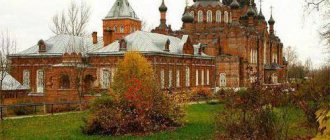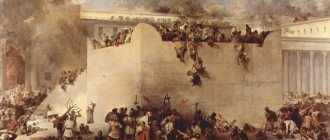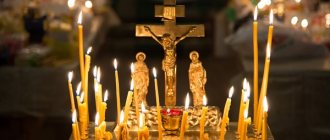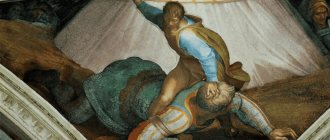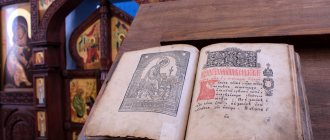Among everyday troubles, people often lose their fortitude, the ability to hear God and trust Him. To return the soul to a calm state, the holy fathers advise reading Psalm 60. This is a short poetic work written by King David, one of the chapters of the biblical book of Psalms. In it you can see the appeal of a fallen man to his Creator and see how the Lord encourages him.
About the author About the book
Text of prayer Psalm 60
In Church Slavonic
In the end, in songs, to David, Psalm 1 Hear, O God, my prayer, attend to my prayer. 2 From the ends of the earth I cried to You, when my heart was always depressed, You lifted me up on a rock, You taught me. 3 For you have been my hope, a pillar of strength from the face of the enemy. 4 I will dwell in Your village forever, I will be covered in the shelter of Your wings. 5 Because You, O God, have heard my prayers, You have given wealth to those who fear Your name. 6 You will add days upon the days of the king, his years until the day of his generation and generation. 7 Who will remain in the presence of God forever; who will seek His mercy and truth? 8 Thus I will sing praises to Your name forever; I will offer up my prayers day by day.
In Russian
To be performed, in the image of hymns. David. 1 Hear, O God, my prayer; give ear to my prayer. 2 From the ends of the earth I cried to You in the despondency of my heart; You raised me up on a rock, 3 you showed me the way, for you became my hope, a strong tower in the face of the enemy. 4 I will dwell in Your abode forever, I will hide under the shelter of Your wings. 5 For You, O God, have heard my prayers, and have given an inheritance to those who fear Your name. 6 You will add days to the days of the king, his years to the days of generation and generation; 7 He will remain forever before God; who can comprehend His mercy and truth? 8 Thus will I sing to Your name forever, to fulfill my vows day by day.
Text of Psalm 60 in Russian
Most Bible scholars agree that the inscription (the first lines) points specifically to King David. He composed this prayer at a time when he was being persecuted by one of his sons, Absalom. During this period of his reign, the Jewish king had to leave the capital of the kingdom, the blessed city of Jerusalem.
At that time, the Jews had only one single temple, and the distance from it made David suffer greatly. After all, the pious ruler could not visit the palace of the Lord and offer his prayers there. Psalm 60 can be divided into several parts:
- A call to God, since only He could become a protector.
- Expectation that the Lord will take care of his protege.
- Glorification of the Creator, caused by the confidence that He will show mercy.
Work as a courier at Yandex.Eda (up to 3,400 rubles per shift) leave a request →
According to the first line, this hymn should be performed on a stringed instrument (this is exactly what the psalter was).
- To the head of the choir. On a string instrument. Psalm of David.
- Hear, O God, my cry, heed my prayer!
- From the ends of the earth I cry to You in the despondency of my heart; take me to a rock out of reach for me,
- for You are my refuge, You are a strong defense from the enemy.
- May I live forever in Your habitation and rest under the shelter of Your wings,
- for You, O God, have heard my vows and have given me the inheritance of those who fear Your name.
- Add the days to the days of the king, extend his years for generations and generations,
- may he abide forever before God; command mercy and truth to protect him.
- And I will sing to Your name forever, fulfilling my vows every day.
History of writing
The life of King David 1000 years before the birth of Christ was accompanied by many obstacles and adversities. He found a time of persecution of the Jews, he was persecuted by King Saul, and his own son Absalom rebelled against him. In moments of sorrow and despondency, the king was saved by faith and prayers. Psalm 60 refers to texts written after the rebellion of Absalom, which painfully wounded David's soul, but was, with God's help, suppressed.
In Church Slavonic in Russian orthography. Text of prayer standing before the Lord.About calling on God in any life circumstances
— — — — — — — — — — — — — — — — — — — — — — — —
Hear, O God, my prayer, Hear my prayer: From the ends of the earth I cried to You, My heart was always depressed, You lifted me up on a stone, You guided me.
For you were my hope, a pillar of the fortress from the face of the enemy.
I will dwell in your village forever, I will cover myself in the blood of your wings.
For you, O God, have heard my prayers, and have given wealth to those who fear your name.
Add days to days of the Tsar, his years until the day of generation and generation.
He will remain forever before God: whoever seeks His mercy and truth; Thus I will sing to Your name forever, Give up my prayers day by day.
In Russian. An educational text for understanding unfamiliar words and expressions of the Church Slavonic language.
About calling on God in any life circumstances
— — — — — — — — — — — — — — — — — — — — — — — —
Hear, O God, my cry, Hear my prayer! From the ends of the earth I cry to You In the despondency of my heart; Take me to the rock, out of reach for me.
For You are my refuge, You are a strong defense from the enemy.
May I live forever in Your dwelling and rest under the shelter of Your wings,
For You, O God, have heard my vows and have given me the inheritance of those who fear Your name.
Add days to the days of the king, extend his years for generations and generations.
May he abide forever before God; Command mercy and truth to guard him. And I will sing to Your name forever, Keeping my vows every day.
PRAYER RULE FOR COMMUNION (sample of preparation during the week):
Monday
(according to secular style - on Sunday evening after Little Compline): Canon of Repentance to our Lord Jesus Christ.
Tuesday
: Canon of prayer to the Most Holy Theotokos.
Wednesday
: Canon to the Guardian Angel.
Thursday
: Canon to Saint John the Baptist.
Friday
: Canon, Akathist or prayers to your patron saint, whose name you bear.
Saturday
: To the Sweetest Jesus.
Sunday
: the first (evening) part of the procession to Holy Communion. The second (morning) part of the sequence is read after the 1st hour.
Attendance at the Divine Liturgy on Sunday is a MANDATORY and IMMEDIATE rule for an Orthodox believer, as is the communion of the Holy Mysteries of Christ. An exception to this RULE is possible only due to a serious or contagious illness, as well as in the event of a natural or social disaster, when it is impossible to get to church.
Note: in this prayer rule and the attached Orthodox calendar, the beginning of a new day is considered to be 18:00.
Interpretation
To better interpret Psalm 60, each verse of the text should be analyzed. Its content contains no references to specific historical events or dates. Rather, it can be attributed to songs of thanksgiving, which describe the miraculous salvation of the righteous by the Lord and praise of the power and beauty of God.
- Verse 2-3 – earth is contrasted with the purity and power of heaven. Earthly sorrows are caused by sin and corruption, and only the Lord can free us from them.
- Verse 4 – The Lord showed David his abode, in which he hoped to find shelter forever.
- Verse 6 – hope for longevity, preservation of the purity of the soul.
- Verse 8 is the promise of the righteous to eternally praise the Lord for the blessings and salvation given.
( 3 ratings, average: 4.67 out of 5)
Interpretation of Psalm 60
The text can be studied in various translations, its meaning will not change. Only at Orthodox services it is impossible to hear it in Russian, since the Russian Orthodox Church uses exclusively Church Slavonic.
- Verses 2 through 4 illustrate turning to God in prayer during difficult times. Despair did not become a reason to turn away from the Lord; on the contrary, in difficult moments the righteous man began to pray even more fervently. He does not simply address the heavens, but “shouts” (that is, screams loudly), in his own words. David is persistent in his requests.
A person can be far from the temple and still have the opportunity to communicate with God. Yes, visiting church is very important, but you can offer prayers absolutely anywhere, even the most remote place. Even if there are only enemies around, a Christian always has his most reliable friend and protector nearby - the Creator.
David asks to be sheltered from trouble on the rock. This is a metaphor that refers to the omnipotence of God. Abiding in God gives the believer a sense of security. Only obedience to the Creator gives the soul serenity and peace, as stated in Psalm 61.
- Verse 5 talks about fulfilling duties to God.
It is not enough to simply declare yourself a Christian and believe “in your soul.” Making your faith alive is possible only through concrete deeds. Although temporary troubles caused David to be removed from the Temple, he was firmly confident that this would soon change.
- Verses 6 through 9 show the psalmist remembering the past. He seeks consolation in the fact that the Lord previously accepted his promises (vows).
Become a courier of the Yandex.Food service right now (up to 3,400 rubles per shift) leave a request →
There are other similar examples in the Bible - for example, God remembered Jacob because of his promises (Genesis, chapter 31, verse 13). Not a single good intention can be hidden from the Creator; they are pleasing to Him. However, a person must be attentive to his life and not neglect the promises he makes to heaven.
Any promise is accompanied by prayer. During the Old Testament, there was only one chosen people, the custodians of faith in the One Living God. Today, anyone can join this dedicated tribe through faith in Jesus. Psalm 60 prophesies this, speaking of a people “fearing the name” of God.
- In verse 7 the author calls himself a king. Even before official recognition, the prophet Samuel anointed young David as king. He is well aware that this position is temporary, just like earthly life, of course. In order to remain forever in the sanctuary of God, it is necessary to worthily serve the King of Heaven. These are also prophetic lines in which one can see a mention of the coming Christ. David is a type of the Messiah.
- In the final verse, the author promises to chant the Name of God every day of his life. This vow may be especially difficult for modern people to keep because gratitude is not a core virtue. Life passes in a hurry and bustle, we consider all the blessings to be the norm of life and strive to acquire even more of them.
- Psalm 101 - text in Russian;
- See here Psalm 126 - text in Russian;
- Psalm 11 - text in Russian: .
In fact, everything that surrounds us - be it the stars in the sky, the air we breathe, a roof over our heads and a piece of bread - is not our merit, but the result of God's care. Life itself is a precious gift from Him. There are more than enough reasons for gratitude. Everyone can see them if they give up their egocentric worldview. Daily gratitude is a small thing that anyone can do.
Psalm 60
The psalm was written by David during the persecution from Absalom, when he fled from Jerusalem. This is indicated both by the very appeal to God - “Hear, O God, my cry” (Ps. 60:2), testifying to the difficult situation of the writer, and by calling himself a king (Ps. 60:7), who at the indicated time was not in Jerusalem, and far from it (Ps. 61:3). David, as a king, was persecuted only once, and it was from Absalom.
Hear, Lord, my prayer and save me, since I only find refuge in You. Let me live forever under Your protection (2–5). You will hear my prayer and return my inheritance to me. May the Lord multiply the days of the king; may he enjoy the eternal mercy of God and then he will thank the Lord with prayers and vows (6-9).
Ps.60:3. From the ends of the earth I cry to You in the despondency of my heart; take me to a rock out of reach for me,
By “the end of the earth,” where David was, one can perhaps understand Mahanaim. The writer calls this area “the end of the earth,” or the border of Palestine in order to show the distance of his present location from Jerusalem and the temple, which for the pious king was an item of prime necessity: there he could be closer to the Lord and devote himself to prayers before Him. David often calls the Lord “Rock.” To erect on a rock - to give firm protection.
Ps.60:5. May I live forever in Your habitation and rest under the shelter of Your wings,
“To live... forever in the habitation” of God may most closely mean David’s hope to remain at the tabernacle until the end of his days, to live in Jerusalem, as well as the desire to enjoy “eternal”, beyond the grave, “closeness to God.”
Ps.60:6. for You, O God, have heard my vows and given me
heritage of those who fear Your name.
“Heard”, “gave” past tenses instead of future ones (past prophetic). - “The inheritance of those who fear Your name” - the Lord preserved for David the inheritance that He promised for those who fear Him. This legacy is the return to him of the unjustly taken away throne. In accordance with Art. 5 can also be understood as the granting of eternal life beyond the grave, as a destiny generally designated for the righteous.
Ps.60:7. Add days to the days of the king, extend
to generation and generation,
“Add days to days” - lengthen life, “ prolong
throughout generation and generation” - throughout the existence of human generations. Let the name of David be preserved in posterity, not in the sense of simply remembering him as only a historical figure, but in the posterity that descended from him. Such a descendant was the promised Messiah, the eternal King.
Ps.60:8. may he abide forever before God; command mercy and truth to protect him.
“To remain... forever before God” - to enjoy eternal mercy, closeness to Him after death.
Ps.60:9. And I will sing to Your name forever, fulfilling my vows every day.
David's request for mercy from God was accompanied by a promise on his part to “fulfill his vows... every day.” Among these vows is the daily glorification of His name.

